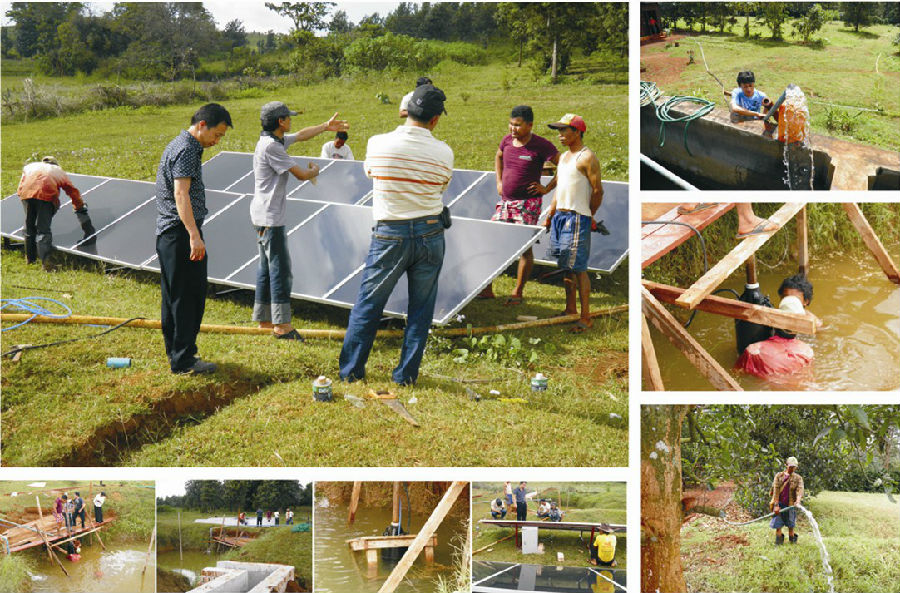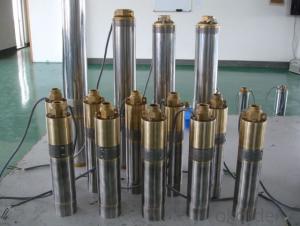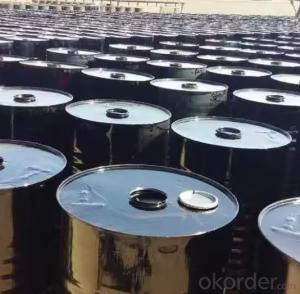Solar Water Pump 3DS-10-100
- Loading Port:
- China Main Port
- Payment Terms:
- TT OR LC
- Min Order Qty:
- -
- Supply Capability:
- 300 sets /month
OKorder Service Pledge
OKorder Financial Service
You Might Also Like
Product description:
Product: Solar water pump
Model:3DS-10
 Appilication:
Appilication:
submersible pump
for deep well or water tank or pond or small lake
for irrigation of a farm cover around 5000 m2
For all kinds of irrigation: flood /sprinkling/ drip
Product specification:
flow rate:4000 liter/ hour, 32m3/day.
lift: 50m-100m
pump diameter: 238mm
well diameter more than 250mm
with BLDC motor, motor power:2000W
but only need solar power:960W, our pump can save more than 50% solar panel power.
Material:
Pump inside: stainless steel and wearable nylon,it enables our solar pump to have 10 years sevice life.
Motor length:30cm,80% shorter than other motors. So that you can pump 80% more water by our solar pump.
Certification:
3 International patent
ISO9001
CE
Warranty:2 years
- Q:What is the average cost of a solar pump?
- The average cost of a solar pump can vary depending on factors such as the size, capacity, and brand. However, a rough estimate for a typical solar pump can range from $1,000 to $5,000.
- Q:How reliable are solar pumps?
- Solar pumps have demonstrated their highly reliable nature across a range of applications. The dependability of these pumps hinges on several factors, including equipment quality, proper installation, and regular maintenance. Manufactured by reputable companies, high-quality solar pumps are designed to endure challenging weather conditions. They are crafted from materials resistant to corrosion and engineered to withstand the test of time. Moreover, these pumps incorporate cutting-edge technologies like MPPT controllers, which optimize system efficiency and performance. For the reliability of solar pumps, correct installation is paramount. It is crucial to ensure the pump is of the appropriate size and positioned optimally to receive ample sunlight exposure. Additionally, proper wiring and connections are vital to prevent electrical complications that could hinder the pump's performance. Regular maintenance is equally important in guaranteeing long-term reliability. This entails cleaning the solar panels to maximize efficiency, monitoring the pump's performance, and inspecting the system for potential issues. By conducting routine maintenance, any problems can be swiftly identified and resolved, minimizing downtime and maximizing pump reliability. In conclusion, solar pumps are a dependable and sustainable solution for a variety of water pumping needs. When installed and maintained correctly, they can provide a consistent and efficient water supply, even in remote areas with limited access to grid electricity.
- Q:Can a solar pump be used for water supply in recreational facilities or parks?
- Yes, a solar pump can be used for water supply in recreational facilities or parks. Solar pumps are an eco-friendly and sustainable solution for water supply as they utilize solar energy to power the pump and do not require grid electricity. They can effectively provide water for various recreational activities such as water fountains, irrigation systems, or even swimming pools in parks or recreational facilities.
- Q:Can a solar pump be used for sewage pumping?
- No, a solar pump cannot be used for sewage pumping. Sewage pumping requires specialized pumps that are designed to handle solid waste and other contaminants, which is not suitable for solar pumps that are typically used for clean water applications.
- Q:Can a solar pump be connected to existing water infrastructure?
- Yes, a solar pump can be connected to existing water infrastructure. Solar pumps are designed to be compatible with different types of water systems, including existing infrastructure. They can be integrated into the existing water supply network by connecting them to the existing pipes and valves. Additionally, solar pumps can also be used to pump water directly into storage tanks or reservoirs, which can then be connected to the existing water system. This allows for a seamless integration of renewable energy sources into the existing water infrastructure, providing a sustainable and efficient solution for water pumping.
- Q:Can a solar pump be used for water supply in electronics or semiconductor manufacturing?
- No, a solar pump cannot be used for water supply in electronics or semiconductor manufacturing. These industries require a high level of purity and precision in their water supply, which can only be achieved through specialized filtration and treatment systems. Solar pumps are typically used for agricultural or domestic water supply purposes, where the water quality requirements are not as stringent.
- Q:Can a solar pump be used in areas with limited access to spare parts or components?
- Yes, a solar pump can be used in areas with limited access to spare parts or components. Solar pumps are designed to be durable and low-maintenance, reducing the need for frequent repairs or spare parts. They are typically built with long-lasting components and require minimal servicing. Additionally, solar pumps are self-contained systems that do not rely on external power sources or complex infrastructure, making them suitable for remote areas with limited access to spare parts or components.
- Q:How do solar pumps handle fluctuations in voltage or power supply?
- Solar pumps are designed to handle fluctuations in voltage or power supply efficiently. They typically have built-in voltage regulators that stabilize the power input, ensuring a consistent and reliable operation. Moreover, solar pumps utilize direct current (DC) motors, which are more tolerant to voltage fluctuations compared to alternating current (AC) motors. This allows them to continue functioning effectively even if there are minor variations in the power supply.
- Q:How much does a solar pump cost?
- The cost of a solar pump can vary depending on factors such as the brand, capacity, and additional features. On average, a basic solar pump can range from $500 to $2,000, while more advanced models with higher capacities can cost anywhere from $2,000 to $10,000 or more.
- Q:What is the typical lifespan of the motor used in a solar pump?
- The lifespan of a motor used in a solar pump can vary depending on several factors, including the motor's quality, maintenance practices, and operating conditions. On average, a well-maintained and high-quality motor in a solar pump can endure for 10 to 20 years. The motor's lifespan can be significantly extended through regular maintenance, which involves tasks like cleaning and lubrication. Additionally, the motor's longevity can be influenced by operating conditions, such as frequency of use and intensity of sunlight. Proper installation and protection from extreme weather conditions can also contribute to the motor's durability. It is important to keep in mind that while the motor itself may have a lengthy lifespan, other components of the solar pump system, such as the solar panels and batteries, may have different lifespans and may require replacement or maintenance over time. Regular monitoring and servicing of the entire system will help ensure optimal performance and prolong the overall lifespan of the solar pump.
1. Manufacturer Overview |
|
|---|---|
| Location | |
| Year Established | |
| Annual Output Value | |
| Main Markets | |
| Company Certifications | |
2. Manufacturer Certificates |
|
|---|---|
| a) Certification Name | |
| Range | |
| Reference | |
| Validity Period | |
3. Manufacturer Capability |
|
|---|---|
| a)Trade Capacity | |
| Nearest Port | |
| Export Percentage | |
| No.of Employees in Trade Department | |
| Language Spoken: | |
| b)Factory Information | |
| Factory Size: | |
| No. of Production Lines | |
| Contract Manufacturing | |
| Product Price Range | |
Send your message to us
Solar Water Pump 3DS-10-100
- Loading Port:
- China Main Port
- Payment Terms:
- TT OR LC
- Min Order Qty:
- -
- Supply Capability:
- 300 sets /month
OKorder Service Pledge
OKorder Financial Service
Similar products
New products
Hot products
Hot Searches
Related keywords
























